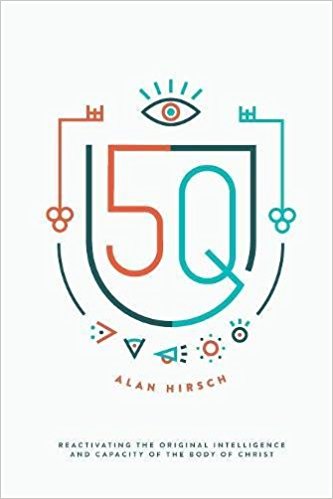Q&A: Should we make more of Baptism in the Holy Spirit?
MK asks:
It’s taken me an age to get to this point, but certainly for some, baptism is just the start. Simply recognising another broken person wants to be fixed. Sometimes, of course, a recognition that parents see their child needs to be fixed which the child confirms later. There is another baptism we need, that from the Spirit. This one must necessarily come later as our brokenness is being mended. Nonetheless it seems crucial. We don’t seem to make too much of this in ‘official’ church, but should we?
[This is a Q&A question that has been submitted through this blog. You can submit a question (anonymously if you like) here: http://briggs.id.au/jour/qanda/]
 This is an interesting question, and it goes where angels fear to tread… to some of the most precious parts of our Christian experience, and the words that we use to describe them. As a church we should be making more of these experiences, but we often struggle for the language, and the courage.
This is an interesting question, and it goes where angels fear to tread… to some of the most precious parts of our Christian experience, and the words that we use to describe them. As a church we should be making more of these experiences, but we often struggle for the language, and the courage.
There is a pastoral dilemma, you see. In our insecurities, often the exuberant expression of one person’s testimony can feel like an invalidation of our own. And “Baptism in the Holy Spirit” is fraught in this regard. I think what you have described is an excellent expression of the Christian journey, but we must be careful in how we talk about it… but sometimes we are too careful and we avoid the difficult conversation.
Here’s the problem: the word “Baptism” is being used in multiple senses – to speak about both the beginning and promise of the Christian journey, and also for the ongoing experience of the Christian journey.
Baptism rightly describes the beginning. Baptism with water in the name of the Father, Son, and Holy Spirit is a sacramental beginning of the Christian journey – it so symbolically embraces the promises of salvation and covenantal inclusion that we can look upon it as the foundation on which our faith experience is built. It incorporates a “fixing” as you say, either for ourselves or as an embrace of our children.
That “fixing” includes the understanding of being “born again” (Baptism symbolises a dying and resurrection), of having the Holy Spirit come and dwell within us (an important declaration in the act of confirming one’s Baptism), of being regenerate by the grace of God, and of taking our place within the Body of Christ.
Our Baptism with water is therefore much more than “John’s Baptism” of repentance only. Yes, it is a sacramental symbol of repentance, but it is also a baptism into Christ. John himself says “I baptised you with water; but He will baptise you with the Holy Spirit” (Mark 1:8), and he is referring to the new beginning that Jesus will bring about.
Similarly, in Acts we see a couple of occasions when new Christians had only received John’s Baptism. Paul’s experience in Ephesus in Acts 19:1-6 describes this:
While Apollos was at Corinth, Paul took the road through the interior and arrived at Ephesus. There he found some disciples and asked them, ‘Did you receive the Holy Spirit when you believed?’
They answered, ‘No, we have not even heard that there is a Holy Spirit.’
So Paul asked, ‘Then what baptism did you receive?’
‘John’s baptism,’ they replied.
Paul said, ‘John’s baptism was a baptism of repentance. He told the people to believe in the one coming after him, that is, in Jesus.’ On hearing this, they were baptised in the name of the Lord Jesus. When Paul placed his hands on them, the Holy Spirit came on them, and they spoke in tongues and prophesied.
Paul baptises them “in the name of Lord Jesus”, as the foundation and beginning of their faith, and the Holy Spirit coming upon them is part and parcel of that. Amongst the baptised people of God there are no gradations, and no one is a second class Christian needing another dose of God’s grace, if you know what I mean.
It’s in this sense of beginnings that I prefer the use of the word “Baptism.” The “official church” does talk about this lot, and usually reasonably well.
Nevertheless, “Baptism in the Holy Spirit” describes a genuine experience, which I share and affirm, even if I might use slightly different language. And, yes, it’s usually something we don’t talk about well at all. Indeed, often we prefer stability and order, and so we inhibit new experiences, misconstrue and misunderstand them, or seek to restrict them to controllable structures and programs. In so doing, even when well-intentioned, we discourage growth and maturity.
The genuine experience that we’re talking about here takes many forms. It invariably involves a sense of God being closer than he has before, of being filled, touched, moved, even overcome by the Spirit of God. It often comes with a sense of freedom, restoration, healing, and sometimes an increase in boldness and courage. I think this is the sense of “being mended” that you are talking about.
It’s an experience that for some can be almost spontaneous and unexpected, for some it comes as an answer to prayer in the midst of trauma or darkness, for some it’s because someone has laid hands on them, others have experienced it in ecstatic worship, others have found an encounter in times of deep contemplation. It is an experience that is often accompanied by the manifestations of the Spirit that we see in Acts and read about in places like 1 Corinthians 12 – tongues, interpretations, prophesying and all the other sorts of gifts of the Spirit.
For some it is a unique one-off phenomenon, for others it’s like a new chapter in their “deeper walk with thee.” It is not wrong to call it a “baptism” with the Holy Spirit, in the broad sense of an “immersion” in the Holy Spirit, a filling up, an overflowing etc. But I try to avoid the “baptism” language so as not to confuse with Baptism as the sacrament that speaks of being included in Christ.
The two senses come close together sometimes though. I have observed that an experience with the Holy Spirit can feel like a fundamental new beginning. I observe this in three ways:
1) Sometimes, in people’s experience, their actual Baptism was not a matter of faith. It had meaning, but it was the meaningfulness of ritual, social expectation and so on. In experiential terms, their Baptism was akin to “the Baptism of John.” The subsequent encounter and “Baptism with the Holy Spirit” coincides with a coming to faith. They have an experience of regeneration and renewal and the presence of God. Theologically, I would affirm this as a “coming to life” in faith of what was previously done in ceremony. In experience, it would feel like a new beginning, an initiation in itself.
2) Sometimes, it is an experience that precedes receiving Baptism in water. People come to faith, and encounter the Holy Spirit in a real and tangible way. In this experience the encounter is a new beginning, and the sacrament is a means of catching up to what God is doing, just like in Acts 10:47.
3) For others the experience so marks a significant step in their walk with God, that it feels like a new beginning, a refreshing, revitalisation of faith. This is especially so if there had previously been resisting of the work of God in their lives, or if they had received a fundamental shift in their understanding of God through the reading and hearing of Scripture, prayer, or prophetic word. This sense of a new beginning can also come with the “laying on of hands” in a commissioning into a ministry (e.g. Acts 13:3) or to impart a spiritual gift (e.g 2 Timothy 1:6). In all these cases, the encounter with the Spirit is a significant moment, and precious, but it’s a part of the journey, a fresh chapter in something already begun. Something broken has become significantly, experientially mended.
In all of these experiences I don’t mind if people call it a “baptism in (or of/with/by) the Holy Spirit” but often I find other language to be more helpful.
But your question is a necessary provocation. Whatever language we use, we must make more of these experiences. We must talk about what’s it like to journey with Jesus through the realities of life. This experience of God, as opposed to the mere theory, must be part of our preaching and teaching, our praying, our sharing, our testimony, our pastoral care, our intercession etc. We must be willing to pray for and help people encounter the Holy Spirit in their lives in real and substantial ways, and help provide the language to describe it.
Instead, it seems to me, that our tendency as the church at large is to practise a form of ongoing abandonment as we act more like a boarding school than the family of God: We’ll give you some rites of passage, teach you some theory, and expect you to act your part – but for everything else you’re on you’re own. “Discipleship” in this caricature is a classroom, and “vocation” is about appointment to house captain or something.
Rather the Holy Spirit calls us to an intimacy with God and a vulnerability, a depth that can we come to share with one another. As we receive him, are “overcome” by him, and yes, in that sense “baptised” in the Holy Spirit, we come to see God, and see one another. We walk with each other, share those experiences of brokenness and restoration (this is discipleship), and we call out to one another what we can see the Holy Spirit is doing and gifting in us and through us (this is vocation).
So yes, we should make much more of these experiences, providing the context, the space, the protection, the understanding, the language, and the simple care for people to grow and encounter God. Sometimes I think we would rather be organised, but at what cost?!
Thanks for the question!



